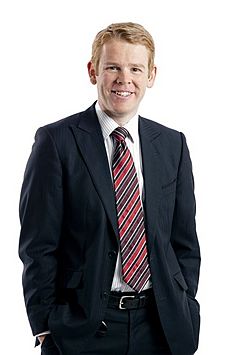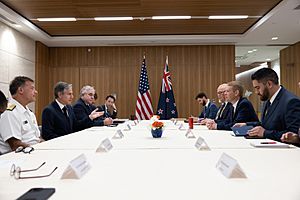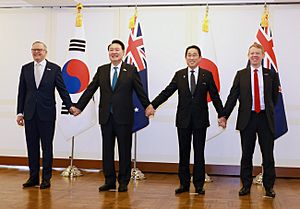Chris Hipkins facts for kids
Quick facts for kids
Chris Hipkins
MP
|
|||||||||||||||||||||||||||||||||||||||||||||||||||||||||||||||||
|---|---|---|---|---|---|---|---|---|---|---|---|---|---|---|---|---|---|---|---|---|---|---|---|---|---|---|---|---|---|---|---|---|---|---|---|---|---|---|---|---|---|---|---|---|---|---|---|---|---|---|---|---|---|---|---|---|---|---|---|---|---|---|---|---|---|
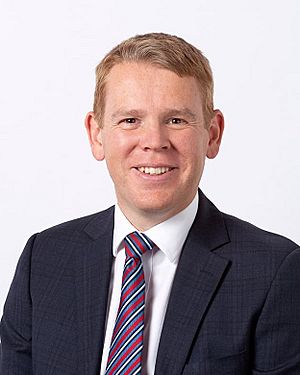
Official portrait, 2022
|
|||||||||||||||||||||||||||||||||||||||||||||||||||||||||||||||||
| 41st Leader of the Opposition | |||||||||||||||||||||||||||||||||||||||||||||||||||||||||||||||||
| Assumed office 27 November 2023 |
|||||||||||||||||||||||||||||||||||||||||||||||||||||||||||||||||
| Prime Minister | Christopher Luxon | ||||||||||||||||||||||||||||||||||||||||||||||||||||||||||||||||
| Deputy | Carmel Sepuloni | ||||||||||||||||||||||||||||||||||||||||||||||||||||||||||||||||
| Preceded by | Christopher Luxon | ||||||||||||||||||||||||||||||||||||||||||||||||||||||||||||||||
| 41st Prime Minister of New Zealand | |||||||||||||||||||||||||||||||||||||||||||||||||||||||||||||||||
| In office 25 January 2023 – 27 November 2023 |
|||||||||||||||||||||||||||||||||||||||||||||||||||||||||||||||||
| Monarch | Charles III | ||||||||||||||||||||||||||||||||||||||||||||||||||||||||||||||||
| Governor-General | Cindy Kiro | ||||||||||||||||||||||||||||||||||||||||||||||||||||||||||||||||
| Deputy | Carmel Sepuloni | ||||||||||||||||||||||||||||||||||||||||||||||||||||||||||||||||
| Preceded by | Jacinda Ardern | ||||||||||||||||||||||||||||||||||||||||||||||||||||||||||||||||
| Succeeded by | Christopher Luxon | ||||||||||||||||||||||||||||||||||||||||||||||||||||||||||||||||
| 18th Leader of the Labour Party | |||||||||||||||||||||||||||||||||||||||||||||||||||||||||||||||||
| Assumed office 22 January 2023 |
|||||||||||||||||||||||||||||||||||||||||||||||||||||||||||||||||
| Deputy |
|
||||||||||||||||||||||||||||||||||||||||||||||||||||||||||||||||
| Preceded by | Jacinda Ardern | ||||||||||||||||||||||||||||||||||||||||||||||||||||||||||||||||
| 4th Minister for National Security and Intelligence | |||||||||||||||||||||||||||||||||||||||||||||||||||||||||||||||||
| In office 25 January 2023 – 27 November 2023 |
|||||||||||||||||||||||||||||||||||||||||||||||||||||||||||||||||
| Prime Minister | Himself | ||||||||||||||||||||||||||||||||||||||||||||||||||||||||||||||||
| Preceded by | Jacinda Ardern | ||||||||||||||||||||||||||||||||||||||||||||||||||||||||||||||||
| Succeeded by | Christopher Luxon | ||||||||||||||||||||||||||||||||||||||||||||||||||||||||||||||||
| Minister Responsible for Ministerial Services | |||||||||||||||||||||||||||||||||||||||||||||||||||||||||||||||||
| In office 25 January 2023 – 27 November 2023 |
|||||||||||||||||||||||||||||||||||||||||||||||||||||||||||||||||
| Preceded by | Jacinda Ardern | ||||||||||||||||||||||||||||||||||||||||||||||||||||||||||||||||
| Succeeded by | Christopher Luxon | ||||||||||||||||||||||||||||||||||||||||||||||||||||||||||||||||
|
|||||||||||||||||||||||||||||||||||||||||||||||||||||||||||||||||
| Member of the New Zealand Parliament for Remutaka Rimutaka (2008–2020) |
|||||||||||||||||||||||||||||||||||||||||||||||||||||||||||||||||
| Assumed office 8 November 2008 |
|||||||||||||||||||||||||||||||||||||||||||||||||||||||||||||||||
| Preceded by | Paul Swain | ||||||||||||||||||||||||||||||||||||||||||||||||||||||||||||||||
| Majority | 8,859 | ||||||||||||||||||||||||||||||||||||||||||||||||||||||||||||||||
| Personal details | |||||||||||||||||||||||||||||||||||||||||||||||||||||||||||||||||
| Born |
Christopher John Hipkins
5 September 1978 Hutt Valley, New Zealand |
||||||||||||||||||||||||||||||||||||||||||||||||||||||||||||||||
| Political party | Labour | ||||||||||||||||||||||||||||||||||||||||||||||||||||||||||||||||
| Spouse |
Jade Hipkins
(m. 2020; separated 2022) |
||||||||||||||||||||||||||||||||||||||||||||||||||||||||||||||||
| Domestic partner | Toni Grace | ||||||||||||||||||||||||||||||||||||||||||||||||||||||||||||||||
| Children | 2 | ||||||||||||||||||||||||||||||||||||||||||||||||||||||||||||||||
| Residences | Upper Hutt, Wellington, New Zealand | ||||||||||||||||||||||||||||||||||||||||||||||||||||||||||||||||
| Alma mater | Victoria University of Wellington (BA) | ||||||||||||||||||||||||||||||||||||||||||||||||||||||||||||||||
| Nickname | Chippy | ||||||||||||||||||||||||||||||||||||||||||||||||||||||||||||||||
Christopher John Hipkins (born 5 September 1978) is a New Zealand politician. He has been the leader of the New Zealand Labour Party since January 2023. He also became the Leader of the Opposition in November 2023.
Before this, he was the 41st Prime Minister of New Zealand from January to November 2023. He also served as the Minister for the Public Service and Minister for Education from 2017 to 2023. From 2020 to 2022, he was the Minister for Health and the COVID-19 Response. He has been a Member of Parliament (MP) for Remutaka since 2008.
Hipkins grew up in the Hutt Valley near Wellington. At Victoria University of Wellington, he was very active in student politics. He was elected president of the VUWSA twice. In 2008, he won the election for the Labour seat of Remutaka.
After Jacinda Ardern led Labour to victory in 2017, Hipkins took on many important roles in the government. He was seen as a "fixer" because he was good at handling different responsibilities.
As Minister of Health, Hipkins was in charge of the government's response to the COVID-19 pandemic in New Zealand. This response was a big part of the 2020 election, which Labour won easily. After the election, Hipkins became the Minister for COVID-19 Response. In January 2023, he became the only candidate to become the leader of the Labour Party after Jacinda Ardern resigned. He was then appointed Prime Minister on 25 January 2023.
His time as Prime Minister started with challenges like the 2023 Auckland Anniversary Weekend floods and Cyclone Gabrielle. He led his party in the 2023 New Zealand general election, where Labour lost to the National Party. He then became the Opposition leader on 27 November 2023.
Contents
Early Life and Education
Christopher John Hipkins was born in the Hutt Valley on 5 September 1978. His mother is a chief researcher for the New Zealand Council for Educational Research.
Hipkins went to Waterloo Primary School and Hutt Intermediate School. He was the head boy at Hutt Valley Memorial College in 1996. He later studied at the Victoria University of Wellington. He was the student president there in 2000 and 2001.
In 1997, as a university student, Hipkins was arrested during a protest at Parliament. The judge later ruled that the protest was peaceful. The judge also said there were no reasons for the arrests.
Hipkins earned a Bachelor of Arts degree in political science and criminology. He then worked as an advisor for different organizations and politicians. These included Trevor Mallard and former Prime Minister Helen Clark.
Time in Opposition (2008–2017)
| New Zealand Parliament | ||||
| Years | Term | Electorate | List | Party |
| 2008–2011 | 49th | Rimutaka | 47 | Labour |
| 2011–2014 | 50th | Rimutaka | 30 | Labour |
| 2014–2017 | 51st | Rimutaka | 9 | Labour |
| 2017–2020 | 52nd | Rimutaka | 7 | Labour |
| 2020–2023 | 53rd | Remutaka | 6 | Labour |
| 2023–present | 54th | Remutaka | 1 | Labour |
Becoming a Member of Parliament (2008)
Hipkins was chosen to run for the Labour-held seat of Rimutaka in the 2008 New Zealand general election. The previous MP, Paul Swain, was retiring. Hipkins won the seat with a small majority of 753 votes.
First Term in Parliament (2008–2011)
For his first nine years in Parliament, Labour was the Official Opposition. In his first speech, Hipkins showed his interest in education. He was Labour's spokesperson for internal affairs. He also served on several parliamentary committees.
Second Term in Parliament (2011–2014)
In the 2011 New Zealand general election, Hipkins won the Rimutaka seat again. His winning margin increased to 3,286 votes.
He was promoted to Labour's shadow Cabinet. He became the spokesperson for state services and education. He also became the Labour Party's chief whip. As education spokesperson, Hipkins spoke out against the government's plans for charter schools in New Zealand. He also opposed the closure of schools in Christchurch after the 2011 earthquake.
In April 2013, Hipkins voted to support the Marriage (Definition of Marriage) Amendment Bill. This bill made same-sex marriage in New Zealand legal.
Third Term in Parliament (2014–2017)
Hipkins won the Rimutaka seat again in the 2014 New Zealand general election. His winning margin grew to 6,664 votes. He continued as education spokesperson and also served as shadow leader of the House.
In Government (2017–2023)
Hipkins was an important member of the Sixth Labour Government. From 2017 to 2023, he was a high-ranking government minister. He was the Minister of Education, Minister for the Public Service, and Leader of the House. He was known as a "fixer". He also took on roles as Minister of Health and Minister for COVID-19 Response during the pandemic. Later, he became Minister of Police.
Fourth Term (2017–2020)
In the 2017 New Zealand general election, Hipkins won the Rimutaka electorate by a large margin of 8,609 votes. He became a Cabinet minister when Labour formed a government. He was appointed Minister for Education.
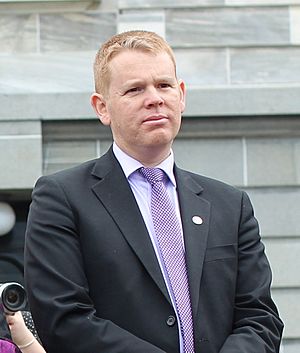
As Education Minister, Hipkins supported getting rid of National Standards and charter schools. He also planned a review of the National Certificate of Educational Achievement (NCEA) system. By September 2018, all twelve charter schools had changed to become state-integrated and special character schools.
In December 2018, Hipkins stopped Victoria University of Wellington from changing its name. He said the university had not asked enough people for their opinions.
In February 2019, Hipkins suggested combining New Zealand's 16 polytechnics into one new organization. This was to help with money problems and fewer students. This new organization, Te Pūkenga, would also take over vocational and apprenticeship programs.
In May 2019, Hipkins announced that the government would spend NZ$95 million to train 2,400 new teachers. This was to help with the teacher shortage.
On 1 August 2019, Hipkins confirmed the plan to merge all polytechnics by April 2020. He also announced that 11 industrial training organizations would be replaced.
After David Clark resigned as Minister of Health in July 2020, Prime Minister Ardern appointed Hipkins as interim health minister. He held this role until the October 2020 general election.
Fifth Term (2020–2023)
Hipkins won his seat, now called Remutaka, in the 2020 New Zealand general election. He received 20,497 votes.
In November 2020, Hipkins kept his education role. He also became Minister for COVID-19 Response and Minister for the Public Service. As Minister of COVID-19 Response, Hipkins introduced rules for wearing face masks on public transport. He also brought in pre-departure tests for overseas travelers. He oversaw the launch of the "My Vaccine Pass" and the national vaccination rollout.
In August 2021, Hipkins made a funny mistake during a press conference. He accidentally told New Zealanders to "spread their legs" instead of "stretch their legs" when going outside.
In January 2022, Hipkins postponed the next MIQ lottery. This was because of a big increase in Omicron cases coming into New Zealand.
In June 2022, Hipkins moved from his COVID-19 response role. He replaced Poto Williams as Minister of Police.
In September 2022, Hipkins apologized to former Finance Minister Bill English. Hipkins had suggested that English had given his brothers special government contracts.
In October 2022, Hipkins announced that the government would remove many COVID-19 rules. These included lockdown and MIQ restrictions, border closures, and vaccine passes. He also confirmed that the government would investigate its COVID-19 response.
Prime Minister (2023)
 |
|
|
Premiership of Chris Hipkins
|
|
|---|---|
| 25 January 2023 – 27 November 2023 | |
| Charles III | |
| Cabinet | Sixth Labour Government of New Zealand |
| Party | New Zealand Labour Party |
| Appointer | Cindy Kiro |
Becoming Prime Minister
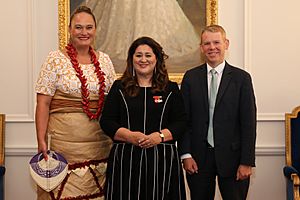
On 19 January 2023, Jacinda Ardern announced she would resign as Labour Party leader. Hipkins became the only candidate to replace her. He was sworn in as Prime Minister by Governor-General Dame Cindy Kiro on 25 January 2023. His deputy prime minister was Carmel Sepuloni, the first Pasifika person to hold this role.
When he became Prime Minister, Hipkins said his main goal was to help New Zealanders with the cost of living. He also said Labour would delay some new projects to focus on the economy.
Domestic Policies
On 26 January, Hipkins met with business leaders in Auckland. He promised his government would work well with businesses. He also said businesses had given feedback on issues like staff shortages.
Hipkins faced the 2023 Auckland Anniversary Weekend floods almost immediately. He visited Auckland to see the damage and talk with emergency services.
After he became Prime Minister, Hipkins' popularity and Labour's support grew in opinion polls.
In February 2023, Hipkins announced that some policies would be stopped or changed. These included a proposed merger of TVNZ and RNZ, and a biofuel rule. He also confirmed that the minimum wage would increase from NZ$21.20 to NZ$22.70 an hour from 1 April 2023.
On 13 March, Hipkins announced more policy changes. These included stopping plans to lower the voting age to 16. The government also redirected NZ$2 billion to help New Zealanders with the cost of living.
On 11 April 2023, Hipkins announced that some COVID-19 rules would stay for at least two more months. These included a seven-day isolation period for positive cases and mask-wearing in hospitals.
The 2023 New Zealand budget, released on 18 May 2023, focused on helping families. It included removing NZ$5 prescription fees and extending free early childhood education. It also provided free public transport for children under 13.
International Relations

On 7 February, Hipkins visited Australia and met Prime Minister Anthony Albanese. They discussed the Section 501 deportation policy. Albanese confirmed his government would review the policy.
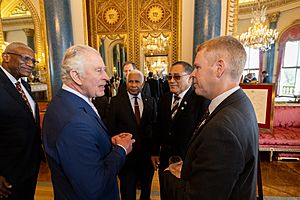
In May 2023, Hipkins attended the coronation of King Charles III. He also met with British Prime Minister Rishi Sunak and New Zealand soldiers. Before leaving, Hipkins spoke with Ukrainian President Volodymyr Zelenskyy to show New Zealand's support.
On 22 May 2023, Hipkins visited Papua New Guinea. He met with leaders from the region and other countries. He supported stronger relations between Papua New Guinea and the United States.
In June 2023, Hipkins led a group to China to improve relations and trade. He met with Chinese President Xi Jinping. They talked about relations between their countries and other global issues.
On 9 July, Hipkins and the President of the European Commission signed a free trade agreement between New Zealand and Europe.
On 8 October 2023, Hipkins strongly spoke out against Hamas' actions during the Gaza war. He said targeting civilians and taking hostages was wrong. He also stated Israel had the right to defend itself. On 19 November 2023, Hipkins called for an immediate ceasefire in the Gaza Strip.
2023 General Election
Hipkins led the Labour Party in the 2023 New Zealand general election. During the campaign, he said Labour would not introduce a capital gains tax if re-elected.
The election results on 14 October showed Labour lost its majority. Hipkins accepted the election loss to National Party leader Christopher Luxon. Hipkins kept his Remutaka electorate seat.
In Opposition (2023–Present)
On 7 November 2023, Labour's MPs voted to keep Hipkins as party leader. On 10 November, Hipkins and Luxon agreed to extend the caretaker government. This was because of long talks between National, ACT, and New Zealand First to form a government. Hipkins continued as caretaker prime minister until 27 November, when Luxon took over.
As Leader of the Opposition, Hipkins is also the spokesperson for ministerial services and national intelligence and security in the Labour shadow cabinet.
In September 2024, a poll showed Hipkins' popularity had fallen. However, several senior Labour MPs supported his leadership. In mid-September 2024, Hipkins attended a British Labour Party conference.
On 12 November 2024, Hipkins spoke at the National Apology to survivors of abuse in state and faith-based care. He acknowledged that past governments had failed abuse victims.
On 7 March 2025, Hipkins announced changes to his shadow cabinet. He also created a new economic team.
In May 2025, Hipkins disagreed with a recommendation to suspend some Te Pāti Māori (TPM) MPs. He felt the proposed suspensions were too long. Parliament later voted to suspend the three Te Pāti Māori MPs on 5 June 2025.
Political Views
Hipkins is generally seen as a moderate politician. He focuses on practical solutions. As a student, he was an activist, but he now describes himself as more moderate. During his time as Prime Minister, he focused on "bread and butter" issues. These included fighting the rising cost of living.
Hipkins is not a monarchist. However, before the coronation of Charles III, he said he would not push for New Zealand to become a republic during his time as Prime Minister. He said that changing the head of state was not an urgent priority.
In June 2024, Hipkins said he was open to changing rules about how MPs claim housing allowances. This followed reports that some MPs were claiming allowances even though they owned property in Wellington.
Personal Life
Hipkins married Jade in 2020. They had two children together. They separated in 2022. In 2018, he took extended paternity leave when his second child was born. He was one of the first senior male cabinet ministers to do this. He later started a relationship with Toni Grace, a former staffer. This relationship became public during his election night speech in October 2023.
See also
 In Spanish: Chris Hipkins para niños
In Spanish: Chris Hipkins para niños
 | Valerie Thomas |
 | Frederick McKinley Jones |
 | George Edward Alcorn Jr. |
 | Thomas Mensah |


